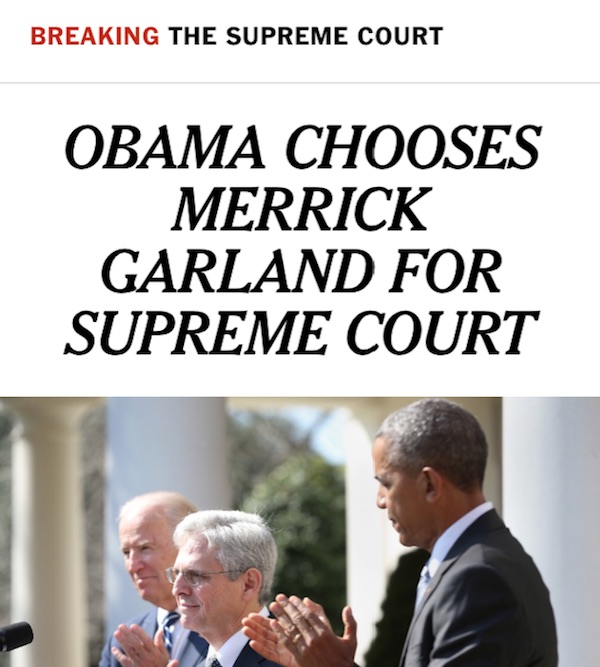
This morning President Obama announced his nominee for the vacant seat on the Supreme Court of the United States. I was asked the following question in relation to this topic yesterday.
“Is diversity what we actually seek in a Supreme Court Justice, or is it knowledgeable interpretation of our nation’s Constitution?”
Knowledgeable interpretation of our nation’s Constitution is absolutely the most important factor in choosing a nominee to the Supreme Court. However, I would also argue that the highest court in the nation should also reflect the broad diversity of our country, across racial, ethnic, religious, gender and ideological grounds.
Here’s why.
Some Conservatives argue that there should be no interpretation of the Constitution at all, simply strict application of the law in accord with what was said in the original document, when it was said. In other words, for Originalists like Justice Antonin Scalia, there’s nothing to be interpreted since the meaning of the Constitution in their eyes was fixed at the time of the Constitution’s enactment.
Conversely, most people would agree that the Constitution was created as a living document that requires application of its tenants (Non-Originalists) to the circumstances that present themselves at varying moments in history. One only need remember that when the Constitution was written, blacks were considered tradable commodities (they weren’t even considered to be human) and these people had none of the rights outlined in the Constitution.
The extension of Constitutional rights to blacks changed because Americans became more enlightened and aware, while actually reinterpreting the Constitution to be more inclusive and accepting, thereby extending rights to a broader group of people. Ultimately, all things being equal among Supreme Court candidates, Americans should prefer to have as great of diversity on the court as possible.
For its first 180 years, justices were almost always white male Protestants. Regardless of the desire to have fully objective humans on a court, that’s not realistic as our ideas, values, culture, and beliefs perpetuate inherent biases, even those of white male Protestants. As humans, we aren’t perfect and neither are our institutions. We have blind spots and curtailing the adverse impacts of those blind spots is essential to ensuring a vibrant and healthy democracy.
If we can establish courts with justices that are more diverse, then there’s a greater tendency that justices themselves may be able to help counter the inherent biases of other justices, and therefore the inherent biases that lie within our culture and society. In short, diversity on the court allows for differences between people in our society to be represented more adequately, and possibly lead to more just decisions for a broader group of people.
Concerns pertaining to diversity on the court have always been a part of the conversation when it comes to constructing courts, albeit the initial tendency was to focus on geographic diversity versus ethnic, religious, or gender diversity. Of course, over time, American leaders recognized that courts could better serve a diverse and pluralistic culture and society by ensuring that there was a diverse set of opinions (no justice is exactly like another).
One of the easiest ways to create that diversity is to select people with differences that are still committed to interpreting the Constitution and applying the nation’s law according to the principles set therein.
It has now been 35 years since the courts included a woman; appalling that it took so long. As such, I would indeed argue that diversity is essential to a strong Supreme Court, and that the greater representation the Court has, in alignment with the diversity of our nation, the stronger we’ll be as a nation. However, the goal of diversity should not supersede a candidates’ penchant for adherence to the law.
In turn, I would argue that the Constitution should always be interpreted and administered in light of changing cultural, economic, and political circumstances so that the rights provided by the Constitution are continuously extended to the broadest swath of society as possible (as has recently happened with gay rights).
No one in America should be excluded from his or her Constitutional rights. And, anytime that it is possible to extend rights to those that have been institutionally marginalized and excluded from access to the rights embedded in our nation’s Constitution, it should be done.
This morning, President Obama announced his Supreme Court nominee, Merrick Garland. Personally, I had hoped that it would be Sri Srinivasan for the Supreme Court. Mr. Srinivasan is 49 and was confirmed unanimously (97-0, with 3 not voting) to the D.C. Circuit in 2013, including yes votes from Senators Ted Cruz, Marco Rubio, and Bernie Sanders.
Mr. Srinivasan, if President Obama had nominated him, would have been the first Asian American Hindu on the Supreme Court, creating greater diversity and increasing minority representation. Unfortunately, an old white guy, but a great Justice, like Merrick Garland will have to suffice in light of the Republican extremism that has swept over this great nation. I guess we’ll have to wait for Hillary Clinton to be elected in November, along with a Democratic majority in the Senate, and for another Supreme Court Justice to retire before someone like Sri Srinivasan is nominated.
In the mean time, what could make America even greater than it already is today? Well, it’s quite simple, learning to accept, embrace, and nurture institutional diversity, acknowledge our unique differences as humans, and love.
Author: Dr. Matthew Wilburn King
Editor: Lindsey Block
Image: New York Times











Read 0 comments and reply